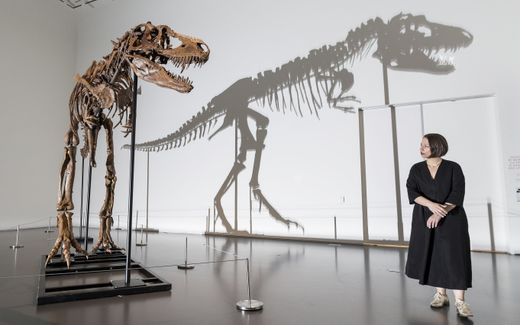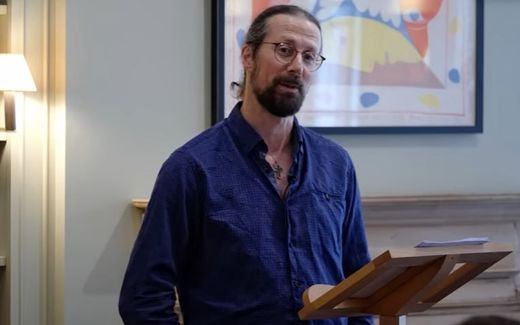The key reasons why the West risks losing human dignity

Refugees from Ukraine rest at a temporary shelter in the main train station of Krakow. Photo AFP, Louisa Gouliamaki
Christian Life
We are the fruits or our roots. We are what we are because of our past. But what if our culture is rooted in the Christian faith? Can we keep going without believing the same truths?
Stay up to date with Christian news in Europe? Sign up for CNE's newsletter.
“I am a Christian atheist!” Some prominent thinkers say so. They don't believe in God or the Bible but they admit that the West was built upon the Christian faith. The ‘Christian atheist’ movement is slowly replacing the more anti-Christian ‘new atheist’ movement, which was made famous by people like Richard Dawkins or Sam Harris.
Slovenian philosopher Slavoj Žižek or British journalist Douglas Murray, to name just a few, are among those who define themselves as ‘Christian atheists’. They are atheists because they reject the ultimate authority of the Bible for all of life.
But they qualify their atheism as ‘Christian’ because they still see value in the Bible. They recognise that it is indeed the foundation of Western civilisation. They also realise that the demise of Christianity is one of the main causes behind the current decay of the West.
Loss
With his recent declaration that Christ was God, the Canadian psychologist Jordan B. Peterson can no longer be considered as a friendly outsider of Christianity. However, the Alliance for Responsible Citizenship (ARC), which he founded, aims to bring together ‘Christian atheists’ and committed Christians concerned with the loss of the Biblical values that once shaped the West.
The ARC defines itself as “a global movement with a vision for a better world where empowered citizens take responsibility and work together to bring flourishing and prosperity to their families, communities, and nations.”
At first glance, it seems that both those who see the Bible as final authority, and those who see it as a valuable myth, have much to share. Yet, upon closer observation, the foundations for their beliefs are worlds apart.
Chasm
Believing Christians (should) take the Bible as authoritative for everything. By contrast, those who don’t recognise the Bible as the revealed Word of God consider other sources to be of equal, if not of superior authority.
Therefore, we can expect that the theme of the upcoming ARC conference in London –What Does It Mean To Be Human?– will very likely reveal the chasm separating true Christians from Christian-friendly atheists.
The definition of man is certainly one of the most fundamental questions that men of all generations have explored. It informs the definition of all the basic structures of society, such as the family, the church or the state. Many answers have been provided to this question, but unless they are grounded in the Christian worldview, they rest upon arbitrary claims.
Genesis
The Bible gives three fundamental answers to what it means to be human. It reveals man’s identity, how he is to relate with other men and women and his function on earth. All these three answers are found in Genesis 1:26-28.
Firstly, Genesis 1:26-28 reveals the identity of man: he bears the image of God. This definition is obviously metaphysical and so there is no way to prove it scientifically. According to the Bible, man cannot be understood apart from God. God’s statement “Let us make man in our image” reveals that man is different from the rest of creation.
Secondly, Genesis 1 not only reveals the identity of the individual man but also his collective identity. Man is not just the image of an unknown God out there. Man is the image of the Triune God, a God that is Three Persons, yet One Substance.
There is such unity of love between the Three Persons of the Trinity that we are, in fact, talking about one and the same God. Therefore, the fact that man is the image of the Triune God, means that such loving relationships ought to be seen within society, be it in the family, the church or any other organisation such as the neighbourhood or the sports club.
Thirdly, Genesis 1 reveals the function of mankind on earth. Man is to rule over all of God’s creation. He must cultivate the land and transform it into a beautiful and fruitful garden. But man is not allowed to do it relying on his own understanding. He must do so according to God’s standards which are revealed in the Bible.
Penalty
The entry of sin in this world has brought confusion to these basic affirmations. Nonetheless, these truths can be recovered through Jesus Christ, the Second Person of the Trinity, who became man himself and paid the penalty of sin so that all things could be restored.
Such answers cannot be attained without first presupposing that God is, and that the written word of the Bible is His revelation. Other definitions of man must rest upon other premises, be it man himself, the world around him, or some abstract notion of non-being.
The Biblical definition of man is the only ground upon which we can coherently justify our belief in the exceptionality of mankind. This is why the idea of human dignity arose only in societies strongly shaped by the Christian worldview, such as what we used to call Christendom, today ‘the West’.
Inequality
Slowly but surely, Christian societies could no longer accept the pagan idea of natural inequality within mankind. All bear the image of God. This is why the ideas of democracy, the rule of law, or free trade arose in Christianity, not within other religions.
The seeds of such values have grown since the arrival of the Christian message in Europe. In his book “Inventing the Individual: The Origins of Western Liberalism”, British American historian Larry Siedentop commented in 2015 on the role that the church father St. Augustine played in that process:
Augustine continued the demolition of the foundation of ancient beliefs and practices that Paul had begun. Equal subjection to divine power –in the depths of motivation– now seemed to make a mockery of the assumption of natural inequality. Belief in the innate superiority of some souls had to be discarded.
Recovery
Both the rich and the poor are the image of God. Both the clever and the simple are the image of God. While there are hierarchies of functions within human societies, there is no hierarchy of value. All men must be considered of equal value in the eyes of God. This foundational truth began to reshape all spheres of society in Christendom accordingly, albeit never perfectly.
The modern West is losing faith in the basic values that have shaped it because it has lost faith in the God of the Bible. The future of the West rests upon the recovery of the Biblical doctrine of man.
Related Articles












